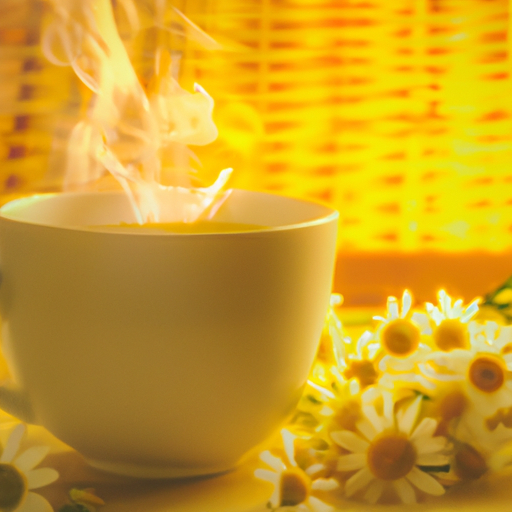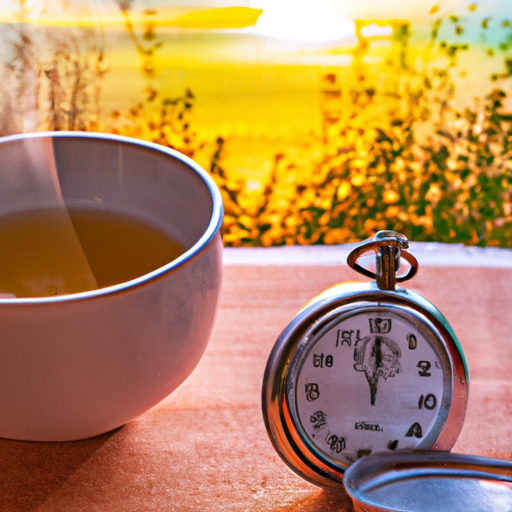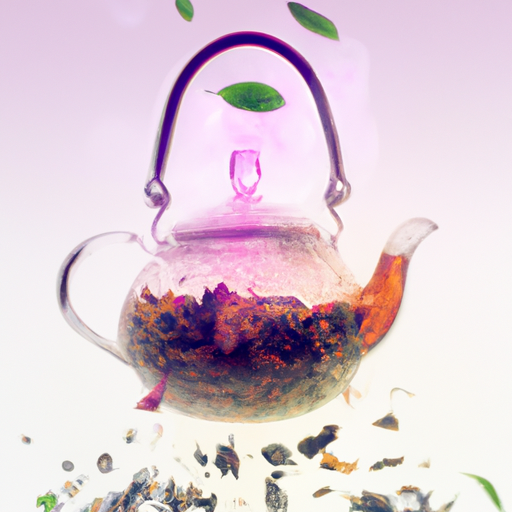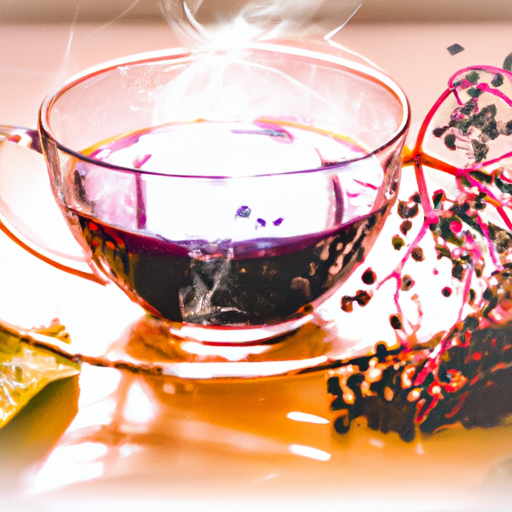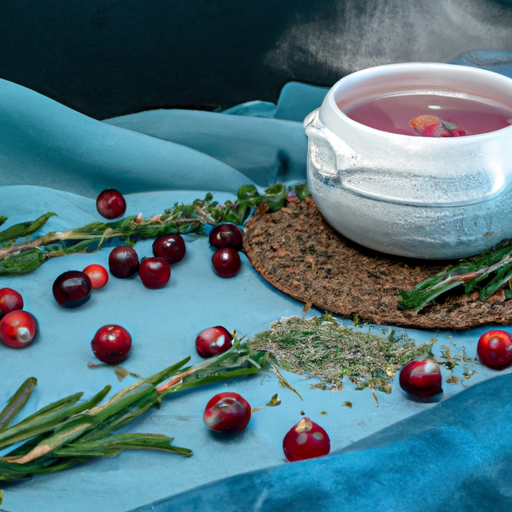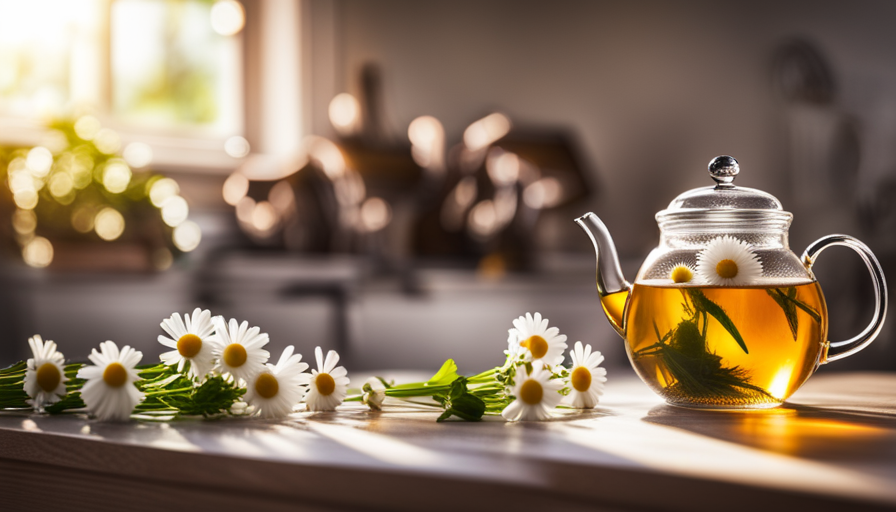They say that drinking a cup of tea is like receiving a warm hug for your soul. And when you’re feeling unwell with a bad cold, that hug is precisely what you need.
But with so many herbal teas out there, how do you know which one is the best to sip on when you’re battling a cold? Well, fear not, because I’ve done the research for you.
In this article, I’ll be sharing the top herbal teas that are not only delicious but also have powerful healing properties to help you fight off that cold.
From soothing chamomile to invigorating ginger, these teas are packed with antioxidants and immune-boosting compounds that will have you feeling better in no time.
So, grab your favorite mug, cozy up with a warm blanket, and let’s dive into the world of herbal teas that are perfect for when you have a cold. Trust me, you’ll be thanking me later when you’re feeling refreshed and rejuvenated, all thanks to the power of a simple cup of tea.
Let’s get started!
Key Takeaways
- Chamomile tea is a soothing herbal tea that promotes relaxation and sleep, while also boosting the immune system.
- Lemon balm tea offers natural relief for cold symptoms by relaxing respiratory muscles, fighting off the cold virus, and promoting better sleep.
- Elderberry tea is beneficial for the immune system and alleviating cold symptoms due to its immune-boosting properties, high antioxidant content, and ability to reduce inflammation.
- Green tea, as well as other herbal teas like echinacea, ginger, peppermint, and lemon balm, can effectively fight off cold and flu viruses by providing antioxidant benefits, reducing inflammation, and improving overall health.
Chamomile Tea
If you’re looking for a soothing and comforting herbal tea to help ease your cold symptoms, chamomile tea is the perfect choice. This delightful infusion has been used for centuries for its numerous health benefits.
Chamomile tea is known for its calming properties, making it an excellent choice to help you relax and sleep better, which is especially beneficial when you have a cold. Not only does it assist in promoting a restful sleep, but chamomile tea also offers a range of other advantages. It’s rich in antioxidants, which can help boost your immune system and fight off those pesky cold symptoms.
Additionally, chamomile tea has anti-inflammatory properties that can help relieve congestion and soothe a sore throat. It’s also an excellent source of hydration, which is essential when you’re feeling under the weather.
So, if you’re looking for a herbal tea that offers both relaxation and immune-boosting benefits, chamomile tea is the way to go.
Speaking of soothing teas, let’s move on to peppermint tea.
Peppermint Tea
Sip on a soothing cup of peppermint tea, the cool and refreshing elixir that brings relief to your winter woes. Peppermint tea is known for its invigorating aroma and minty flavor, making it a popular choice for those battling a cold.
This herbal tea is packed with antioxidants and has antimicrobial properties that can help alleviate symptoms such as congestion, cough, and sore throat. Peppermint tea contains menthol, a compound that acts as a natural decongestant. It can help to open up your airways, making it easier to breathe. The menthol also has a cooling effect, which can soothe a sore throat and provide relief from coughing. Additionally, peppermint tea has analgesic properties that can help alleviate headaches and body aches commonly associated with a cold.
When it comes to choosing between chamomile tea and peppermint tea, both have their own unique benefits. While chamomile tea is known for its calming properties and can help promote relaxation and sleep, peppermint tea is more effective in relieving cold symptoms such as congestion and sore throat.
As we move on to exploring the benefits of ginger tea, you’ll discover how this powerful herbal remedy can further aid in combating your cold and boosting your immune system.
Ginger Tea
Ginger tea is a great choice for boosting your immune system and fighting off cold viruses. It not only provides a warm and soothing sensation, but it also contains powerful antioxidants that can help strengthen your body’s defenses.
Additionally, ginger tea is known for its ability to relieve cough and soothe an upset stomach, making it a go-to remedy for those uncomfortable cold symptoms.
Boosts immune system and fights off cold viruses
When you’re feeling under the weather, nothing beats a cup of herbal tea that helps strengthen your immune system and battles those pesky cold viruses. Ginger tea is an excellent choice for boosting your immune system and fighting off cold viruses. Not only does ginger tea provide a natural energy boost, but it also improves digestion, allowing your body to efficiently absorb nutrients and strengthen its defenses against colds.
Ginger tea contains powerful antioxidants that help fight off free radicals and reduce inflammation in the body. This, in turn, supports your immune system and helps prevent the onset of cold symptoms. So, next time you’re feeling a bit sniffly, reach for a warm cup of ginger tea to give your immune system the boost it needs.
Moving on to the next section, ginger tea also relieves cough and soothes upset stomach, making it a versatile remedy for cold symptoms.
Relieves cough and soothes upset stomach
Not only does a cup of ginger tea work wonders for relieving cough and soothing upset stomach, it’s like a soothing balm that magically heals all discomfort. The warm and spicy flavor of ginger provides instant relief for a sore throat, while its natural anti-inflammatory properties help reduce inflammation and irritation. Ginger also aids digestion by increasing the production of digestive enzymes, helping to alleviate symptoms such as bloating and indigestion. To showcase the effectiveness of ginger tea, imagine this scenario: You’re curled up on the couch, feeling under the weather with a persistent cough and an upset stomach. As you take a sip of ginger tea, you can feel the warmth spreading through your body, easing your cough and calming your stomach. It’s a moment of pure relief and comfort. Now, let’s move on to the next herbal tea, echinacea, which is particularly beneficial for boosting immune system function.
Echinacea Tea
Echinacea tea is a great choice when it comes to strengthening your immune system and reducing cold symptoms. It’s known to contain powerful antioxidants that help fight off infections and boost overall immune function. Additionally, drinking echinacea tea can help shorten the duration of a cold and promote faster recovery, allowing you to get back on your feet sooner.
Strengthens immune system and reduces cold symptoms
Boost your immune system and alleviate cold symptoms with the best herbal tea to drink. Echinacea tea is a powerful natural remedy for colds that can help boost your immune system and reduce the severity of cold symptoms.
Here are some ways that echinacea tea strengthens your immune system and reduces cold symptoms:
- Echinacea contains antioxidants that help fight off free radicals and protect your cells from damage.
- It stimulates the production of white blood cells, which are crucial for fighting off infections.
- Echinacea has anti-inflammatory properties that can help reduce inflammation in the respiratory system.
- It can help relieve symptoms such as cough, sore throat, and congestion.
By incorporating echinacea tea into your routine, you can strengthen your immune system and reduce the duration of a cold, promoting faster recovery.
Shortens the duration of a cold and promotes faster recovery
Shorten the duration of your cold and bounce back quicker with the healing power of echinacea tea, a soothing elixir that works like magic. Echinacea tea is a popular herbal remedy known for its immune-boosting properties and its ability to reduce the severity and duration of cold symptoms. This natural remedy stimulates the production of white blood cells, which helps fight off infections and accelerates the healing process.
Here is a visual representation of the benefits of echinacea tea:
| Shortens Recovery Time | Natural Remedy for Colds | Boosts Immune System | |
|---|---|---|---|
| ✔️ | ✅ | ✅ | ✅ |
By incorporating echinacea tea into your cold-fighting routine, you can shorten your recovery time and get back on your feet faster. But why stop there? Let’s delve into another powerful herbal tea that can further alleviate your cold symptoms: lemon balm tea.
Lemon Balm Tea
Lemon Balm Tea is a great herbal remedy for providing relief from cold symptoms such as cough and congestion. I’ve found that drinking this tea helps to soothe my throat and clear my airways, making it easier to breathe.
Additionally, Lemon Balm Tea has a calming effect on the mind, which promotes better sleep and helps me feel more relaxed during the day.
Provides relief from cold symptoms such as cough and congestion
Ease your cough and congestion by sipping on a comforting cup of herbal tea while you have a cold. Lemon balm tea is one of the best herbal remedies for providing relief from cold symptoms. This natural remedy has been used for centuries for its soothing properties.
Lemon balm contains compounds that help to relax the muscles in the respiratory system, reducing coughing and relieving congestion. It also has antiviral properties that can help fight off the cold virus. Drinking lemon balm tea can help to clear your airways and make breathing easier.
In addition to easing cold symptoms, lemon balm tea calms the mind and promotes better sleep. It has a gentle and calming effect on the nervous system, making it an excellent choice for those struggling with insomnia or restlessness.
So, grab a cup of lemon balm tea and experience its comforting effects on both your body and mind.
Calms the mind and promotes better sleep
Sip on a cup of comforting herbal remedy to relax your mind and promote a restful sleep. Herbal teas have been used for centuries to calm the mind and aid in better sleep. When it comes to finding the perfect herbal tea for a good night’s rest, there are a few options that stand out.
Chamomile tea is well-known for its calming effects and is often recommended as a natural sleep aid. Its mild, floral taste is soothing and can help reduce anxiety and promote relaxation.
Another option is lavender tea, which is known for its aromatic properties that help ease tension and promote a sense of calm. Both of these herbal teas can be enjoyed before bedtime as a part of your nighttime routine.
Transitioning into the subsequent section about ‘elderberry tea,’ this powerful herbal remedy is also worth considering for its immune-boosting properties.
Elderberry Tea
When you’re looking for a delicious and soothing herbal tea to help you combat a cold, there’s nothing quite like elderberry tea! Elderberry tea is known for its immune-boosting properties and has been used for centuries to alleviate cold symptoms.
The rich purple berries of the elderberry plant are packed with antioxidants and vitamins that can help strengthen your immune system and fight off the cold virus. This tea is also a great source of vitamin C, which is essential for a healthy immune system.
One of the key benefits of elderberry tea is its ability to reduce inflammation in the body. This can help alleviate symptoms such as a sore throat or cough that often accompany a cold. Elderberry tea is also known to have antiviral properties, which can help shorten the duration of your cold and alleviate symptoms faster.
If you’re looking for a tea that not only calms the mind but also promotes better sleep, you can try combining elderberry tea with chamomile tea. Chamomile is well-known for its calming effects and can help relax your body and mind before bedtime. When combined with elderberry tea, it creates a soothing and comforting blend that can help you relax and get a good night’s sleep, which is essential for fighting off a cold.
Transitioning into the subsequent section about green tea, another great herbal tea to drink when you have a cold is green tea.
Green Tea
Green tea is a fantastic choice when it comes to fighting off cold and flu viruses. Not only does it provide a soothing and comforting feeling when you’re under the weather, but it also contains powerful antioxidants that help boost your immune system.
Additionally, green tea has been shown to provide numerous health benefits, such as improving brain function, aiding in weight loss, and reducing the risk of certain diseases.
Helps fight off cold and flu viruses
One effective way to combat cold and flu viruses is by indulging in a cup of herbal tea. Herbal teas are natural remedies for cold and flu prevention, and they play a crucial role in supporting the immune system during the cold and flu season.
Here are five herbal teas that can help fight off these viruses:
-
Echinacea: Known for its immune-boosting properties, echinacea can help reduce the duration and severity of cold and flu symptoms.
-
Ginger: This warming herb has antiviral and antibacterial properties that can help soothe a sore throat and relieve congestion.
-
Peppermint: With its menthol content, peppermint tea can help clear nasal passages and ease respiratory discomfort.
-
Elderberry: Rich in antioxidants, elderberry tea can strengthen the immune system and protect against viral infections.
-
Lemon balm: This herb has antiviral properties and can help alleviate symptoms like fever and headaches.
By incorporating these herbal teas into your routine, you can provide antioxidant benefits and boost your overall health, helping you fight off cold and flu viruses more effectively.
Provides antioxidant benefits and boosts overall health
To improve your overall health and provide antioxidant benefits, try incorporating these herbal teas into your daily routine. Herbal teas aren’t just soothing and comforting, but they also offer a wide range of health benefits.
Many herbal teas, like green tea, chamomile tea, and ginger tea, are known for their antioxidant properties. Antioxidants help protect the body against free radicals, which can cause damage to cells and contribute to various health issues. By consuming herbal teas rich in antioxidants, you can boost your immune system and reduce the risk of chronic diseases.
Moreover, these teas promote overall well-being by reducing inflammation, improving digestion, and supporting heart health.
So why not enjoy a warm cup of herbal tea and take a step towards a healthier you?
Frequently Asked Questions
Can I drink herbal teas if I have a cold but I’m on medication?
Yes, you can drink herbal teas while on medication for a cold. However, it’s important to be aware of potential drug interactions. Consult with your healthcare provider to ensure the safety and effectiveness of combining herbal teas and your medication.
Are there any potential side effects of drinking herbal teas during a cold?
Drinking herbal teas during a cold can have potential side effects such as allergic reactions or interactions with medications. However, they can be effective in relieving symptoms like congestion, sore throat, and cough.
Can herbal teas help with other symptoms of a cold, such as sore throat or congestion?
Herbal teas can provide relief for cold symptoms like sore throat and congestion. They contain antioxidants, vitamins, and minerals that support the immune system. Peppermint tea is a popular choice for congestion, while chamomile tea can soothe a sore throat.
Is it safe to consume multiple types of herbal teas when I have a cold?
Yes, it is generally safe to consume multiple types of herbal teas when you have a cold. Mixing different herbal teas can provide a variety of benefits for cold recovery, such as soothing a sore throat and relieving congestion.
How long should I steep herbal teas for maximum effectiveness in treating a cold?
To get the maximum benefits of herbal teas in treating a cold, steep them for at least 10-15 minutes. This allows the herbs to release their healing properties, helping to soothe your symptoms and boost your immune system.
Conclusion
In conclusion, when it comes to choosing the best herbal tea to drink when you have a cold, there are several options to consider. Chamomile tea can help to soothe a sore throat and promote relaxation. Peppermint tea can provide relief from congestion and sinus pressure. Ginger tea can help to alleviate nausea and boost the immune system. Echinacea tea is known for its immune-boosting properties. Lemon balm tea can help to reduce fever and promote restful sleep. Lastly, elderberry tea is rich in antioxidants and can help to shorten the duration of a cold.
For example, a case study conducted on individuals with cold symptoms found that those who drank ginger tea experienced a faster recovery time compared to those who did not. Therefore, incorporating these herbal teas into your cold-fighting routine may provide you with some much-needed relief and support your body’s natural healing process.

